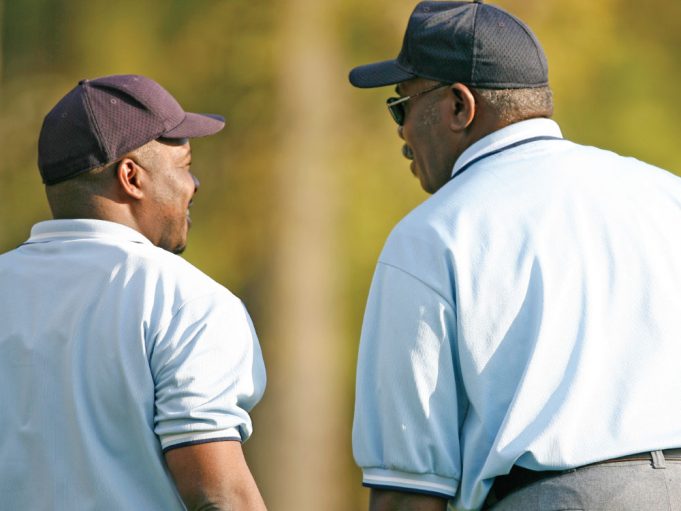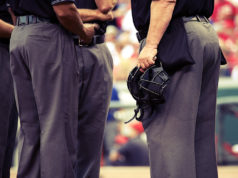W
hich of the following is defined as “the art, skill or profession of making discriminating judgments”?
a. Sports officiating.
b. Studying texts for the purpose of dating them.
c. Judging the quality of a literary or artistic work.
For all of you who instantly jumped on sports officiating, sorry. Though your heart is in the right place, we are now voting you off the island, because, according to Webster, the latter two definitions fit the word criticism, a subject near and dear to officials everywhere.
And while criticism is the topic of this column, we will not be dissecting your everyday coach-player-fan variety. No, this criticism will be brought to you by your partners. But wait! There’s more. Not only will we be addressing the criticism with which your fellow officials grace you, but we’ll look only at that criticism they offer you during the game. It has probably happened at one time or another to every official who has ever ventured into a game. You make the call and out of nowhere comes another official with his or her take on the play.
Or worse, perhaps you’ve run across strong-willed officials who are “always” right and have no qualms about letting everyone at the contest know it’s their game to call.
Many officials, particularly younger ones, encounter a dominant referee or umpire early in their careers. They want everything called the way they want it. You could call something clearly in your area of coverage and they will say, “No! That’s not the right call! No! That’s not a foul!” It gets you mad.
While officials are generally comfortable with a postgame critique from their peers, correction during a game is harder to deal with — especially when it’s done in a heavy-handed way. And the reason is simple: It’s right out there in the open — no closed doors in the locker room shielding the comments from ears for which they were never intended.
Not only does that embarrass the official being corrected, it can have a serious effect on that official’s ability to call the next game. The person being corrected loses credibility, and then the teams start jumping on that official on every call. It certainly makes for a long night, and that official might start to think he or she is in the wrong business.
In-game criticism comes in many forms and it’s a fairly common occurrence. But there are potential dangers if you’re the one doing the correcting. If you critique a partner in the middle of a game, you’re going to sidetrack the official’s thought process, possibly making said official jittery the rest of the game.
That’s not to say critical discussion between officials shouldn’t or doesn’t happen during games. There is a place for it if done properly. For instance, between innings you can go to a partner and say, “Hey, your head height’s a little low. Why don’t you move up? I think you’ll see that outside pitch a little bit better.”
Don’t forget that newer officials are still game officials, and they need to maintain the respect of the players and coaches as much as any other officials. If a certain amount of in-game critical discussion is necessary, make sure you do it in a discreet manner, never right after a controversial call. Avoid making a show of calling the official over to you or discussing the situation loudly. Instead, discreetly approach your partner during a down moment in the game and briefly discuss the situation in a very low voice.
At the same time you should endeavor to control your body language. Even if no one can hear what you and your partner are discussing, they can sure get an idea of it through your body language. Don’t shake your head, point at any particular spots on the field or court and don’t throw your hands up in the air. The best stance to take is a relaxed posture with your hands at your side or behind your back.
Taking the time during a game to offer constructive criticism is probably acceptable and many times even welcomed when it involves a newer official who is still learning the officiating craft. But in the case of critiquing a true peer, an official who has been through the wars a time or two and who has an established reputation, offering criticism during the game is probably a no-no.
You have to read the official and the situation that happened and see how receptive the official might be. You can’t help, you can’t coach, you can’t teach anybody unless they’re ready to be taught. In the case of a veteran peer, you’re more likely to find open ears after the game in the locker room.
The proper way to give an in-game critique is now obvious, but how should an official accept comments from a peer during a contest?
While it won’t always be easy, officials on the butt-end of an in-game critique should do their best to accept the comments with grace. If you have to get mad, do it later, far from the confines of the field. Try to extract useful nuggets of information from the incident, things you can use to improve your skills. And for those veterans who find themselves striding toward a peer, a teachable moment in hand, it might be beneficial to remember a code to which the American armed forces subscribe: “In the military you praise in public, you discipline in private.”
What's Your Call? Leave a Comment:
Note: This article is archival in nature. Rules, interpretations, mechanics, philosophies and other information may or may not be correct for the current year.
This article is the copyright of ©Referee Enterprises, Inc., and may not be republished in whole or in part online, in print or in any capacity without expressed written permission from Referee. The article is made available for educational use by individuals.
















